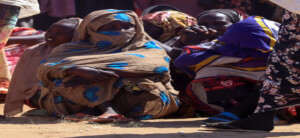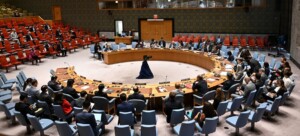SPLM-N El Hilu: Sudan Bar draft constitution ‘resists radical change’
The constitution proposal recently proposed by the Sudanese Bar Association (SBA) does not address the roots of the country’s crisis according to Abdelaziz El Hilu, head of the Sudan People’s Liberation Movement-North (SPLM-N El Hilu).
 SPLM-N leader Abdelaziz El Hilu giving a speech in Kauda, South Kordofan (social media)
SPLM-N leader Abdelaziz El Hilu giving a speech in Kauda, South Kordofan (social media)
The constitution proposal recently proposed by the Sudanese Bar Association (SBA) does not address the roots of the country’s crisis according to Abdelaziz El Hilu, head of the Sudan People's Liberation Movement-North (SPLM-N El Hilu).
The draft transitional constitution framework document “deliberately neglects to address the question of the nature of the state in a radical way,” he asserted in an interview published on the movement's website, accusing them of “using eloquence and cleverness as camouflage.”
El Hilu said that the constitution proposal is “a new attempt to resist radical change.”
Regarding the proposals for a political charter, including those of the Sudanese resistance committees and the Forces for Freedom and Change, El Hilu said that they focus on sharing power and distributing positions, rather than addressing the main reasons for crises in Sudan.
He said that the military have taken power as a shield against accountability, describing those who are waiting for the army and the Rapid Support Forces (RSF) to give up all power to civilian government as “delusional”.
The rebel leader described the Juba Peace Agreement signed by the Sudanese government and the Sudan Revolutionary Front (SRF) alliance of a number of rebel movements in the South Sudanese capital in October 2020, as “a quota deal between the elites and the RSF generals, which has nothing to do with the crucial issues of concern in Sudanese society”.
SPLM-N El Hilu, with its stronghold in Kauda, South Kordofan, and the mainstream Sudan Liberation Front in Darfur, under the leadership of Abdelwahid El Nur did not join the peace negotiations in Juba. El Nur categorically rejects entering peace talks before security in the region has been restored.
El Hilu separately entered into negotiations following a visit of PM Abdallah Hamdok in January 2020, but withdrew half a year later in protest of the chairmanship of the government delegation by Lt Gen Mohamed Hamdan ‘Hemeti’, Deputy Chairman of the Sovereignty Council and Commander-in-Chief of the Rapid Support Forces (RSF).
In a statement on November 16, 2020, SLPM-N El Hilu reaffirmed its position that “the path to peace begins by addressing the roots of the Sudanese crises, foremost of which is the issue of separating religion and state to ensure that religion is not exploited in politics and the repetition of previous experiences that have damaged the unity of the Sudanese peoples and led to the secession of South Sudan.”
An attempt by the Communist Party of Sudan in May this year to persuade El Hilu and El Nur to form a political alliance failed.
The SBA draft document has been given support by a number of pro-democratic political forces, who proposed some amendments, and approved the final version at the start of September. The Embassies of France, Germany, Italy, the Netherlands, Norway, Spain, Sweden, the United Kingdom, and the United States are taking the document as a “serious and encouraging initiative.” Last week, the AU-IGAD-UNITAMS Trilateral Mechanism offered its support of the SBA’s “continued efforts to include a vast array of civilian political parties and forces” in the initiative.











 and then
and then